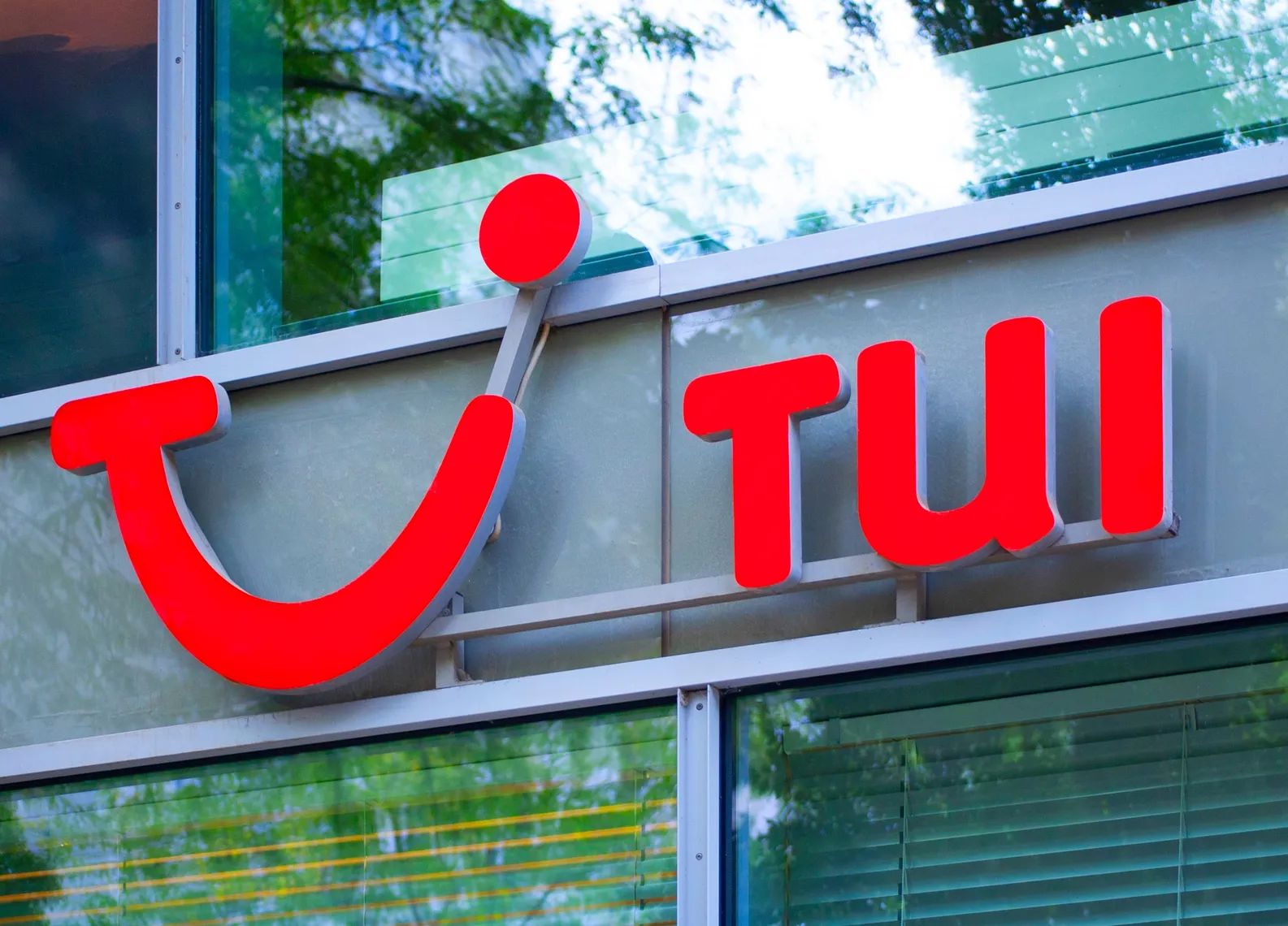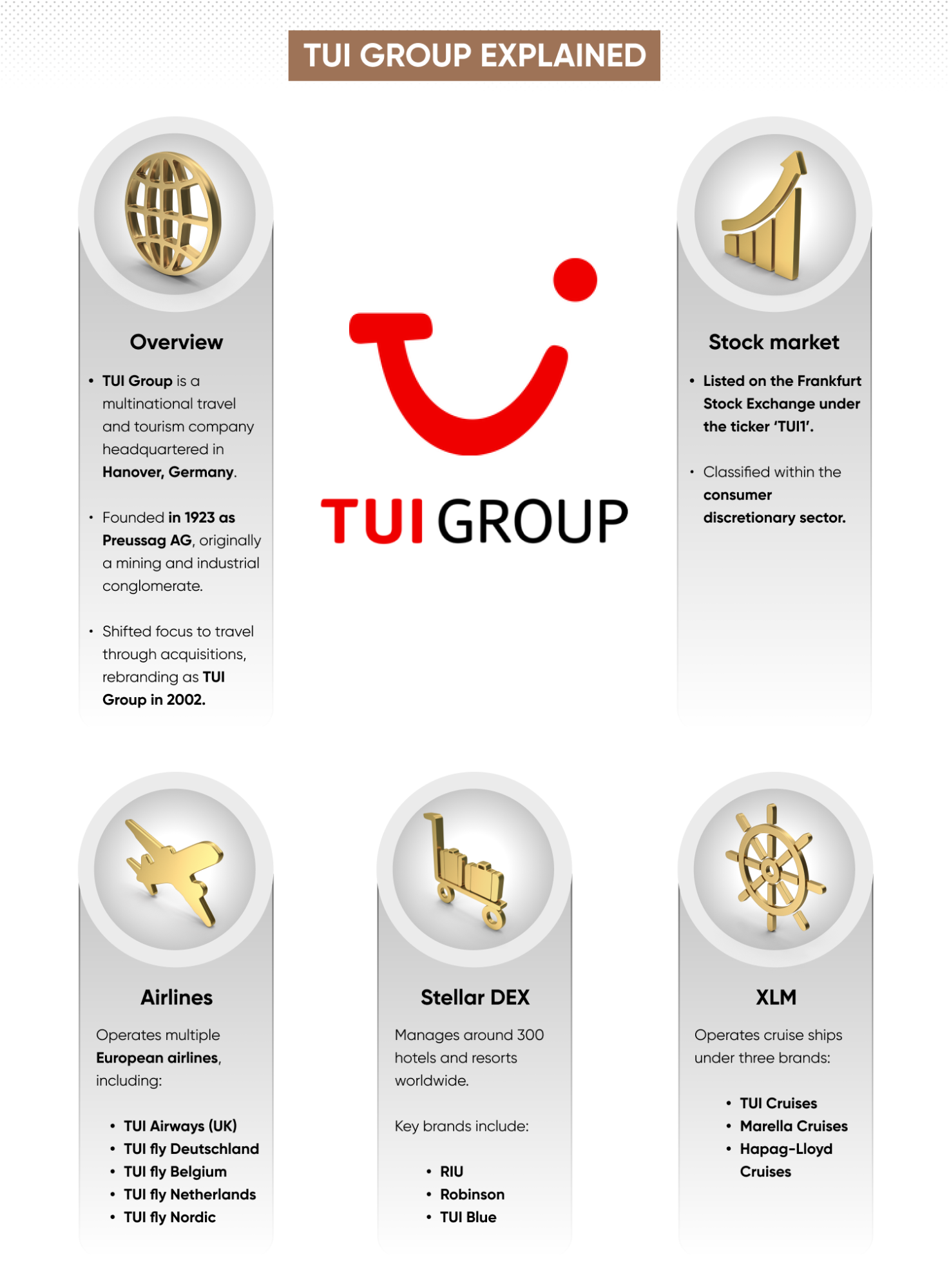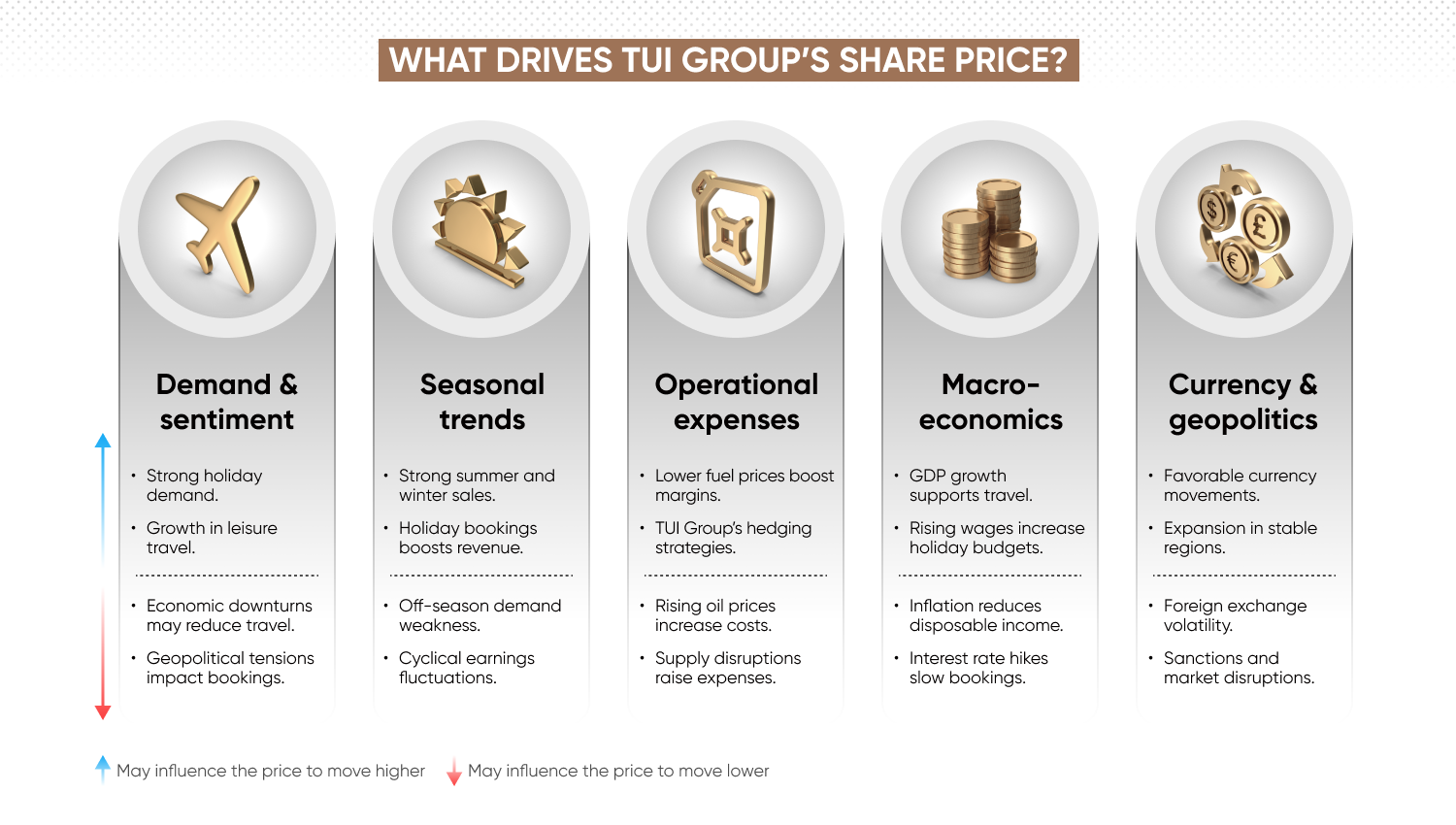How to trade TUI

What is TUI?
TUI Group is a multinational travel and tourism company headquartered in Hanover, Germany. Founded in 1923 as Preussag AG, a German industrial and mining conglomerate, TUI transitioned into the travel sector through a series of acquisitions in the late 20th century, culminating in its full rebranding as TUI Group in 2002.
Today, TUI operates several European airlines, including TUI Airways (UK), TUI fly Deutschland, TUI fly Belgium, TUI fly Netherlands, and TUI fly Nordic. The company also manages approximately 300 hotels and resorts globally, operating brands such as RIU, Robinson, and TUI Blue. Additionally, TUI operates cruise ships under three brands: TUI Cruises, Marella Cruises, and Hapag-Lloyd Cruises.
TUI is listed on Frankfurt Stock Exchange under the ticker symbol ‘TUI1’, classified within the consumer discretionary sector.

What is TUI’s share price history?
Past performance isn’t a reliable indicator of future results.
TUI Group has been publicly traded since its listing on the Frankfurt Stock Exchange under the ticker symbol ‘TUI1’. The company’s modern stock market presence dates back to 2002, when it fully transitioned from an industrial conglomerate (Preussag AG) into a dedicated travel and tourism business.
The onset of the Covid-19 pandemic affected TUI’s revenue as global travel restrictions led to widespread cancellations. As a result, the company suspended dividend payments to its shareholders and TUI’s share price dropped from its opening price of €32.24 on 2 January 2020 to €6.85 on 16 March 2020. In response, the company secured multiple bailout packages from the German government, including a €1.8 billion ‘bridge loan’, to ensure liquidity. TUI’s share price ended the year at €14.14 on 30 December 2020.
A rebound in demand
As travel demand gradually rebounded in 2021, TUI's stock price saw a partial recovery and its shares reached €24.57 per share on 25 February 2021. Ongoing uncertainty concerning Covid-19 weighed on the travel sector, and TUI’s share price closed at €13.82 on 30 December 2021 – down approximately 2.26% from the previous year.
Geopolitical tensions weighed on TUI’s share price in March 2022 due to TUI’s largest single shareholder, Alexey Mordashov, being sanctioned after Russia’s invasion of Ukraine. This introduced further uncertainty which impacted sentiment, and TUI’s share price closed at €8.05 on 30 December 2022 – a decrease of around 41.75% from the previous year.
In March 2023, TUI announced a €1.8 billion capital increase, issuing new shares at a discount to existing investors. The move aimed to strengthen the company’s balance sheet and reduce reliance on government-backed financial aid.
Reverse stock split
Additionally, a 10-for-1 reverse stock split occurred on 24 February 2023 to consolidate shares and stabilise the market. While necessary for long-term stability, this dilution temporarily pressured the stock price, which traded between €5.05-€10 for the remainder of the year, closing at €7.06 on 29 December 2023.
In 2024, TUI’s share price reflected renewed optimism as global travel demand rebounded. Improved financial performance and strong summer booking trends supported a recovery. Its share price fluctuated throughout the year due to seasonal travel patterns and economic patterns– trading between €5.50-€8.88 – and closed the year at €8.36.
As of 10 March 2025, TUI shares trade at €6.87, reflecting a 17% decrease since the beginning of the year.
All prices are adjusted for stock splits.
Which factors might affect the TUI live stock price?
TUI’s live stock price is influenced by travel demand, seasonality, fuel costs, macroeconomic conditions, and currency fluctuations.
Travel demand and consumer sentiment
As a global travel and tourism operator, TUI’s stock price is sensitive to shifts in consumer demand for holidays and leisure travel. Increased demand during peak seasons or periods of economic growth can drive revenue and improve investor sentiment. For instance, TUI’s stock price rose in mid-2024 as strong summer bookings outpaced pre-pandemic levels.
However, external disruptions – such as geopolitical tensions, health crises, or economic downturns – could weaken demand. A notable example is the COVID-19 pandemic, which led to widespread cancellations and a sharp decline in TUI’s share price in 2020.
Seasonality and peak booking periods
TUI’s earnings and share price movements often align with seasonal travel trends. The company generates a significant portion of its revenue during summer and winter holiday periods, making its financial performance cyclical.
Strong summer bookings typically support the stock price, as seen in Q3 2024 when TUI reported record revenues from Mediterranean holiday packages. Conversely, lower demand in off-peak months can weigh on earnings and investor sentiment, potentially leading to seasonal fluctuations in TUI’s share price.
Fuel costs and operational expenses
TUI operates a fleet of aircraft and cruise ships, making fuel prices a key cost driver. Rising oil prices can increase operational expenses, potentially impacting profitability and stock performance. In 2022, higher fuel costs following supply disruptions contributed to margin pressures across the airline and cruise industries, including TUI.
While TUI employs hedging strategies to manage price volatility, significant fuel price increases can still affect earnings. Conversely, falling energy prices could support profitability and lift sentiment.
Economic conditions and discretionary spending
As a consumer discretionary stock, TUI’s performance is influenced by broader economic conditions. Strong GDP growth, rising wages, and low unemployment tend to support higher discretionary spending on travel. For example, the stock benefited from the post-pandemic recovery in 2023–2024, as consumers prioritised travel despite inflationary pressures.
However, periods of economic uncertainty, such as recessions or interest rate hikes, can reduce disposable income, leading to lower bookings and potential downside for TUI’s share price.
Currency fluctuations and geopolitical risks
TUI generates revenue across multiple regions, making foreign exchange movements a potential factor in stock price volatility. A weaker euro relative to the British pound or US dollar can increase operating costs for European travellers, potentially affecting demand. Additionally, geopolitical events – such as the impact of sanctions on key markets – can influence earnings and investor sentiment. For instance, Russia-related sanctions in early 2022 affected TUI Group’s largest shareholder and introduced market uncertainty.

Is TUI a travel stock?
Yes, TUI Group is classified as a travel and tourism stock in the consumer discretionary sector, operating across multiple segments in the travel and tourism industry – including airlines, cruises, hotels, and package holidays.
Traders interested in TUI might also consider other travel and tourism stocks, such as:
-
easyJet (EZJ.L): a UK-based budget airline operating across Europe with a strong focus on leisure travel – Trade easyJet shares.
-
Ryanair (RYA.I): a major European low-cost carrier known for its cost-efficient operations and extensive short-haul network – Trade Ryanair shares.
-
Airbnb (ABNB), which operates in the short-term rental market, benefiting from the rise of alternative accommodation options – Trade Airbnb shares.
-
Expedia Group (EXPE), which owns Expedia, Hotels.com, and Vrbo, with strong market share in online travel services – Trade Expedia Group shares.
Learn more about stock markets in our comprehensive shares trading guide.
What are TUI’s stock trading hours?
TUI Group’s stock market trading hours are the same as the Frankfurt Stock Exchange – which is open Monday to Friday – where it's listed under the symbol ‘TUI1’. Here are the hours:
-
Winter: from 8:00am to 4:30pm UTC.
-
Summer: from 7:00am to 3:30pm UTC.
You can follow TUI’s stock performance with our TUI share price chart.
Monitoring TUI’s activity can help you to keep an eye out for the effects of any fundamental or technical events that may affect short-term movements in the TUI Group share price.
How to trade TUI shares with CFDs
If you want to take a position on TUI shares, you have two options. First, you can buy physical shares in the company through the Frankfurt Stock Exchange, where it’s listed. In this case, investing in TUI stocks means you will own a share, or shares, in the company. This can be considered a long-term investment, as you’re hoping for the price to rise over time.
Alternatively, you can trade a derivative product such as a contract for difference (CFD) on the underlying TUI stock market price, and speculate on its price movements without actually owning the asset. A CFD is a financial contract, typically between a broker and a trader, where one party agrees to pay the other the difference in the value of a security, between the opening and closing of the trade.
CFD trading is unlike traditional investing. With CFDs, you can either hold a long position (speculating that the price will rise) or a short position (speculating that the price will fall). While CFDs are often used for short-term trades, they can also be held for longer periods depending on your trading strategy.
Another key difference between buying physical TUI shares and trading through a derivative is the leverage that can be employed with the latter. CFDs are traded on margin, which means that a trader can get exposure to larger positions with a relatively small outlay. In this scenario, both your profits and losses are amplified, making such trading risky. You can learn how to trade shares in our comprehensive guide to shares trading.
To trade TUI stock CFDs with us, just sign up for a Capital.com account, and once you’re verified, you can use our advanced web platform or download our intuitive yet easy-to-use app. It’ll take just a few minutes to get started and access the world’s most-traded markets.
FAQs
Does TUI pay dividends?
No, TUI Group does not currently pay dividends. It suspended payments in 2020 due to COVID-19 and government aid conditions. In April 2023, TUI completed a €1.8 billion capital increase, reducing its reliance on state support. However, as of March 2025, dividends have not resumed. Future payouts depend on earnings, debt reduction, and shareholder approval.
Are TUI shares a good buy?
TUI shares offer exposure to travel and tourism but come with risks. While strong bookings in 2024 supported recovery, profitability remains pressured by high fuel costs, inflation, and geopolitical factors. Multiple capital raises have also diluted shareholder value. Analysts’ views vary, and the stock remains volatile. Traders should review financials, industry trends, and technical indicators before investing.
Is TUI financially stable?
TUI has taken steps to strengthen its financial position after the challenges of 2020–2022, including multiple capital raises and cost-cutting initiatives. The company reported underlying EBIT of €50.9 million for the first quarter of 2025, an improvement from €6.0 million in the same period of the previous year. Despite these improvements, the company remains sensitive to macroeconomic conditions, interest rates, and seasonal fluctuations in travel demand.
Where is TUI based?
TUI Group is headquartered in Hanover, Germany. It operates across Europe, with major markets in the UK, Germany, and the Nordics. The company runs six airlines with around 150 aircraft, including TUI Airways (UK), and has a presence in over 100 destinations worldwide. TUI operates over 300 hotels with 214,000 beds and 17 cruise liners. The company is publicly listed on the Frankfurt and Hanover Stock Exchanges under the ticker symbol 'TUI', having left the London Stock Exchange in February 2024.
Who owns TUI shares?
TUI's shareholder base includes institutional investors, retail traders, and private equity firms. As of July 2023, institutional investors held 57.8% of TUI's shares, while private investors owned 30.2%. Alexey Mordashov held 10.9% of the shares, and RIU S.A. (Familie Riu Güell) owned 1.1%. Other major institutional shareholders include BlackRock and Vanguard, while retail investors hold a significant portion of the stock.